- Advanced Physics LaboratoryStudents in the Astronomy & Astrophysics, Engineering Physics, and Space Physics programs work on experiments and projects in the Advanced Physics Lab as part of their…
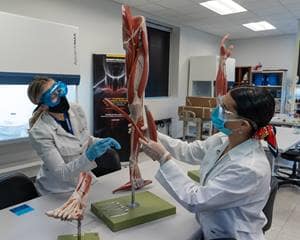 Anatomy and Physiology LabThe Anatomy and Physiology Lab serves to support upper level biology courses such as Anatomy and Physiology and Behavioral Neuroscience…
Anatomy and Physiology LabThe Anatomy and Physiology Lab serves to support upper level biology courses such as Anatomy and Physiology and Behavioral Neuroscience… Applied Cognition & Training Science LabThe Applied Cognition & Training Science Lab investigates human and machine system issues related to automation, expertise, and the science and practice of training…
Applied Cognition & Training Science LabThe Applied Cognition & Training Science Lab investigates human and machine system issues related to automation, expertise, and the science and practice of training… Applied Perception and Performance LabThe Applied Perception and Performance Lab (APPL) is interested in aging, perception, and the performance of complex everyday tasks like driving…
Applied Perception and Performance LabThe Applied Perception and Performance Lab (APPL) is interested in aging, perception, and the performance of complex everyday tasks like driving…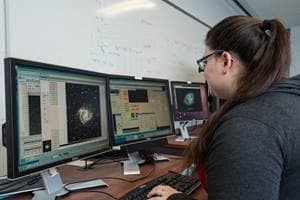 Astrophysics LabThe Astrophysics Lab is used specifically for research in planetary science and astrophysics. Faculty and students can observe with the SARA telescopes in Arizona and…
Astrophysics LabThe Astrophysics Lab is used specifically for research in planetary science and astrophysics. Faculty and students can observe with the SARA telescopes in Arizona and…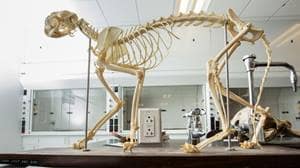 Biology and Organic Chemistry LabThe Biology Lab is the primary space for students taking the introductory and specialized laboratory courses in Life Sciences…
Biology and Organic Chemistry LabThe Biology Lab is the primary space for students taking the introductory and specialized laboratory courses in Life Sciences…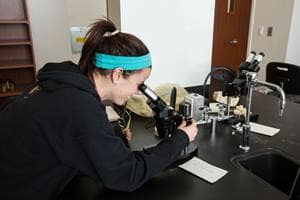 Chemistry LabWith UV/Vis spectrophotometers, FTIR spectrometer, and gas chromatography, the Chemistry Lab is a teaching lab and prep space for student and faculty research…
Chemistry LabWith UV/Vis spectrophotometers, FTIR spectrometer, and gas chromatography, the Chemistry Lab is a teaching lab and prep space for student and faculty research…- Cybersecurity and Assured Systems Engineering (CyBASE) CenterThe Cybersecurity and Assured Systems Engineering (CyBASE) Center hosts a group of faculty members with diverse interests in cybersecurity, such as IT/OT security, aviation…
- Diffuse Emission From Astrophysical Plasmas LabThe Diffuse Emission from Astrophysical Plasmas (DEAP) Lab is used to design, build and test the next-generation of wide-field spectrometers to be used on astronomical…
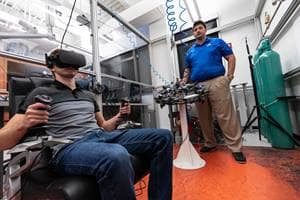 Engineering Physics Propulsion LabThe Engineering Physics Propulsion Laboratory (EPPL) at Embry-Riddle Aeronautical University (ERAU) is a cutting-edge research facility that engages in high-tech projects…
Engineering Physics Propulsion LabThe Engineering Physics Propulsion Laboratory (EPPL) at Embry-Riddle Aeronautical University (ERAU) is a cutting-edge research facility that engages in high-tech projects…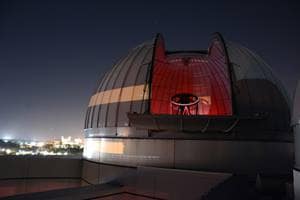 ERAU Campus ObservatoryThe centerpiece of the Astronomy and Astrophysics program is the 1-meter diameter Ritchey-Chrétien reflecting telescope. This telescope, built in 2014 and housed atop…
ERAU Campus ObservatoryThe centerpiece of the Astronomy and Astrophysics program is the 1-meter diameter Ritchey-Chrétien reflecting telescope. This telescope, built in 2014 and housed atop…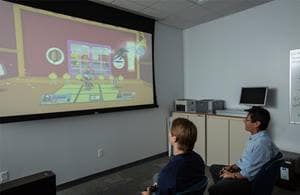 Game-Based Education & Advanced Research Studies (GEARS) LabsThe GEARS lab is a multidisciplinary group made up of Embry-Riddle Aeronautical University students and faculty. Our research efforts focus on using games and simulation…
Game-Based Education & Advanced Research Studies (GEARS) LabsThe GEARS lab is a multidisciplinary group made up of Embry-Riddle Aeronautical University students and faculty. Our research efforts focus on using games and simulation…- General Physics LaboratoryThe General Physics Laboratories are a suite of rooms supporting the General Education Laboratory component of nearly every major program on campus…
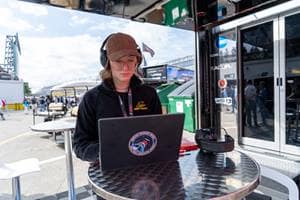 Integrative Aerospace and Exercise Physiology Laboratory (IAEP)The Integrative Aerospace and Exercise Physiology Laboratory (IAEP) aims to broaden our knowledge of human fatigue during strenuous activities, specifically exercise.…
Integrative Aerospace and Exercise Physiology Laboratory (IAEP)The Integrative Aerospace and Exercise Physiology Laboratory (IAEP) aims to broaden our knowledge of human fatigue during strenuous activities, specifically exercise.…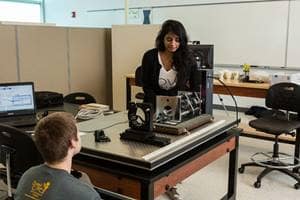 Laboratory for Exosphere and Near-Space Environment Studies (LENSES)The Laboratory for Exosphere and Near-Space Environment Studies (LENSES) is used to develop extremely sensitive spectroscopic equipment for the study of faint, diffuse…
Laboratory for Exosphere and Near-Space Environment Studies (LENSES)The Laboratory for Exosphere and Near-Space Environment Studies (LENSES) is used to develop extremely sensitive spectroscopic equipment for the study of faint, diffuse…- Laboratory for Solar-Magnetosphere-Ionosphere Research (LASMIR)The Laboratory for Solar-Magnetosphere-Ionosphere Research (LASMIR) is part of the Center for Space and Atmospheric Research (CSAR) and is located within the Physical…
- Modern Physics and Microelectronics LaboratoryStudents in the Astronomy & Astrophysics, Engineering Physics, and Space Physics programs work on advanced experiments in the Modern Physics Laboratory…
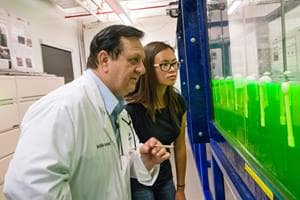 Nonlinear Waves LaboratoryThe cutting-edge Waves Lab will allow the Embry-Riddle community to perform research in fluid dynamics with special focus in physical oceanography, nonlinear waves, rogue…
Nonlinear Waves LaboratoryThe cutting-edge Waves Lab will allow the Embry-Riddle community to perform research in fluid dynamics with special focus in physical oceanography, nonlinear waves, rogue…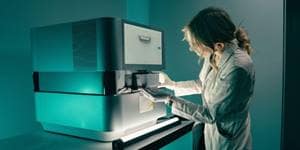 Omics Lab for Health and Human PerformanceThe Omics Lab for Health and Human Performance performs various nucleotide-based analysis on various organisms from bacteria to plants and animals, including humans.…
Omics Lab for Health and Human PerformanceThe Omics Lab for Health and Human Performance performs various nucleotide-based analysis on various organisms from bacteria to plants and animals, including humans.…- Physics & Astronomy Lab, Observatory Control Room & WorkshopThis suite of rooms on the fifth floor of the College of Arts & Sciences building is home to the university’s astronomical observatory, including the 1-meter telescope…
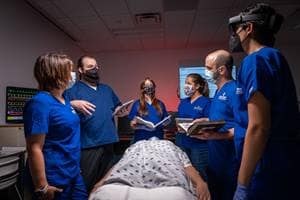 Research Engineering and Applied Collaborations in Healthcare (REACH) LabThe REACH Lab enhances medical systems by investigating a variety of patient safety issues in collaborations with clinical experts. We partner with professionals in academic…
Research Engineering and Applied Collaborations in Healthcare (REACH) LabThe REACH Lab enhances medical systems by investigating a variety of patient safety issues in collaborations with clinical experts. We partner with professionals in academic…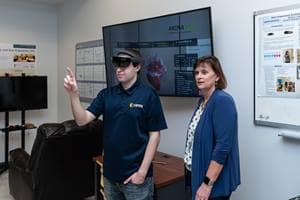 Research in User eXperience Lab (RUX)The Research in User eXperience (RUX) lab investigates issues related to user experience and usability of software, products, and processes…
Research in User eXperience Lab (RUX)The Research in User eXperience (RUX) lab investigates issues related to user experience and usability of software, products, and processes…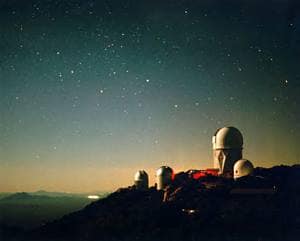 Southeastern Association for Research in Astronomy (SARA)SARA is a 15-university consortium led by ERAU that operates 1-meter class telescopes for astronomical research and education at Kitt Peak National Observatory in Arizona…
Southeastern Association for Research in Astronomy (SARA)SARA is a 15-university consortium led by ERAU that operates 1-meter class telescopes for astronomical research and education at Kitt Peak National Observatory in Arizona… Space and Atmospheric Instrumentation LaboratoryThe Space and Atmospheric Instrumentation Laboratory (SAIL) is part of the Center for Space and Atmospheric Research (CSAR) and is located within the Physical Sciences…
Space and Atmospheric Instrumentation LaboratoryThe Space and Atmospheric Instrumentation Laboratory (SAIL) is part of the Center for Space and Atmospheric Research (CSAR) and is located within the Physical Sciences…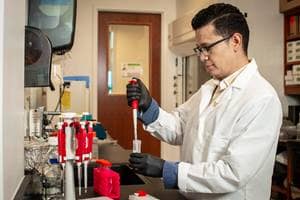 Space Microbiology LabThe Space Microbiology Laboratory studies the genetic and physiological responses of cells to the combined effect of microgravity and space-relevant radiation fluxe…
Space Microbiology LabThe Space Microbiology Laboratory studies the genetic and physiological responses of cells to the combined effect of microgravity and space-relevant radiation fluxe…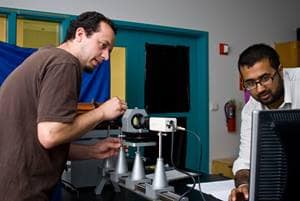 Space Physics Research Lab (SPRL)The primary focus of research done in the Space Physics Research Lab (SPRL) is to investigate the composition, dynamics and electrodynamic processes of the Earth’s middle…
Space Physics Research Lab (SPRL)The primary focus of research done in the Space Physics Research Lab (SPRL) is to investigate the composition, dynamics and electrodynamic processes of the Earth’s middle…
Contact Us
Associated Labs & Facilities
Embry-Riddle is part of the SARA Consortium (Southeastern Association for Research in Astronomy) composed of more than 13 member colleges. The SARA consortium operates two telescopes: the 0.9-m SARA-North at Kitt Peak in Arizona, and the 0.6-m SARA-South at Cerro Tololo in Chile. For more information visit the Sara Observatory.

 Anatomy and Physiology Lab
Anatomy and Physiology Lab Applied Cognition & Training Science Lab
Applied Cognition & Training Science Lab Applied Perception and Performance Lab
Applied Perception and Performance Lab Astrophysics Lab
Astrophysics Lab Biology and Organic Chemistry Lab
Biology and Organic Chemistry Lab Chemistry Lab
Chemistry Lab Engineering Physics Propulsion Lab
Engineering Physics Propulsion Lab ERAU Campus Observatory
ERAU Campus Observatory Game-Based Education & Advanced Research Studies (GEARS) Labs
Game-Based Education & Advanced Research Studies (GEARS) Labs Integrative Aerospace and Exercise Physiology Laboratory (IAEP)
Integrative Aerospace and Exercise Physiology Laboratory (IAEP) Laboratory for Exosphere and Near-Space Environment Studies (LENSES)
Laboratory for Exosphere and Near-Space Environment Studies (LENSES) Nonlinear Waves Laboratory
Nonlinear Waves Laboratory Omics Lab for Health and Human Performance
Omics Lab for Health and Human Performance Research Engineering and Applied Collaborations in Healthcare (REACH) Lab
Research Engineering and Applied Collaborations in Healthcare (REACH) Lab Research in User eXperience Lab (RUX)
Research in User eXperience Lab (RUX)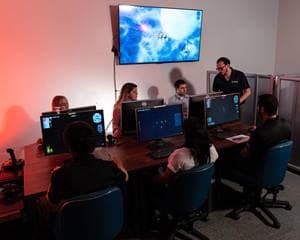 Small Team Analog Research Lab
Small Team Analog Research Lab Southeastern Association for Research in Astronomy (SARA)
Southeastern Association for Research in Astronomy (SARA) Space and Atmospheric Instrumentation Laboratory
Space and Atmospheric Instrumentation Laboratory Space Microbiology Lab
Space Microbiology Lab Space Physics Research Lab (SPRL)
Space Physics Research Lab (SPRL)